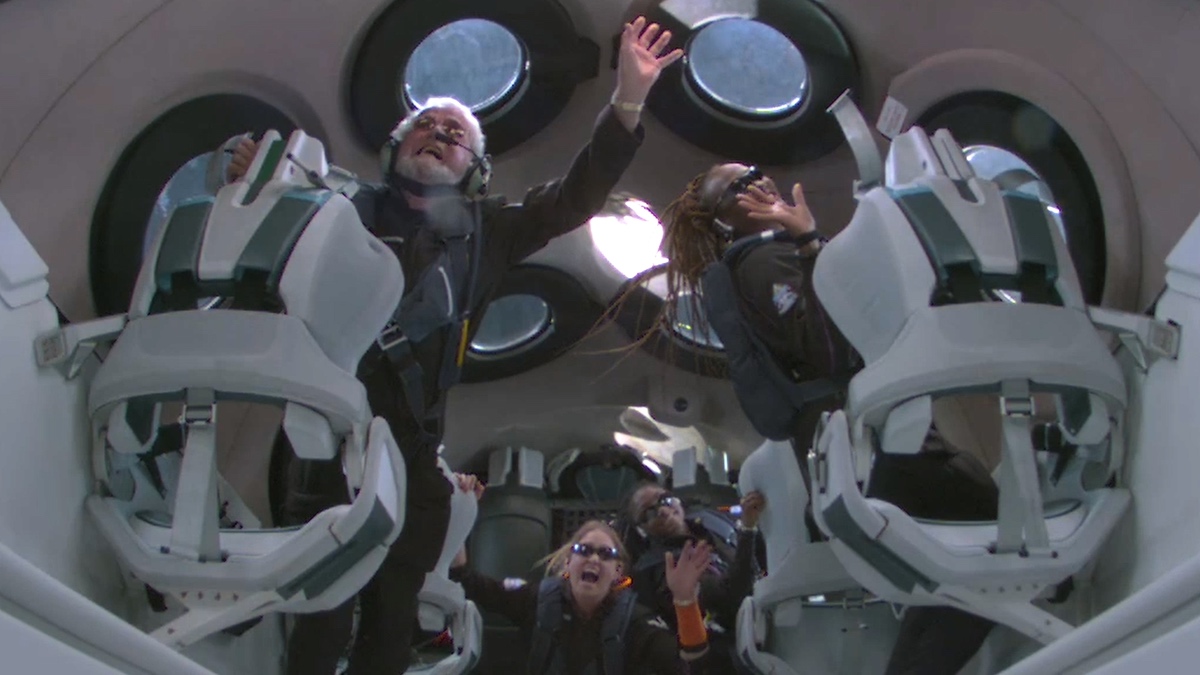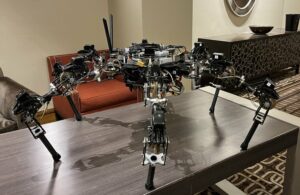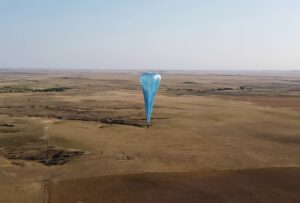
WASHINGTON — Medical researchers and commercial spaceflight advocates are working to begin a new effort to study the health issues and risks that space travel poses to a more diverse population of private astronauts.
Virgin Galactic is scheduled to perform the latest flight of its VSS Unity suborbital spaceplane Jan. 26 from Spaceport America in New Mexico. The Galactic 06 mission will carry four customers along with two pilots, a change from earlier flights that flew three customers and one astronaut trainer. The company has not disclosed the identities of those customers.
The Virgin Galactic flights, along with other suborbital flights by Blue Origin and several orbital missions by SpaceX, have allowed dozens of private astronauts to go to space in the last few years. Many of those people would likely have not passed strict medical standards used by NASA and other space agencies for professional astronauts.
Examples include Jon Goodwin, an 80-year-old man who flew on a Virgin Galactic mission last year despite having Parkinson’s disease. Hayley Arceneaux, a member of the Inspiration4 Crew Dragon mission in 2021, is a cancer survivor with a prosthetic leg bone. Actor William Shatner went on a Blue Origin suborbital flight in 2021 at the age of 90, making him the oldest person to go to space.
“There’s going to be more and more and more,” said Jim Bridenstine, former NASA administrator, of such private astronauts in remarks at a two-day workshop this week in Tulsa, Oklahoma, that he helped organize. “When we think about these activities, we’ve got to absolutely keep people safe.”
The concern he and others at the meeting discussed is a lack of information about health risks to populations much broader than professional astronauts. Commercial spaceflight in the United States operates on an “informed consent” regime where prospective private astronauts are informed of the various risks and then consent to accept them.
“If you’re going to do informed consent, we have to be able to do the ‘informed’ piece,” Bridenstine said.
The workshop discussed a proposal outlined in a recent report to establish a Human Research Program for Civilians in Spaceflight and Space Habitation, or HRP-C. The effort, modeled on NASA’s own Human Research Program, would collect medical data from spaceflight participants and conduct focused research on potential spaceflight risks.
The purpose of HRP-C is research, not regulatory. “Our mission is to have as many people fly in space as possible based on strong science,” said Michael Schmidt, chief executive of Solvaris Aerospace. “It was never about how to screen people who should and shouldn’t go.”
There have been some efforts to collect medical data on private astronauts but done on an ad hoc basis. One such effort is by the Translational Research Institute for Space Health (TRISH), called Enhancing Exploration Platforms and Analog Definition, or EXPAND, that started with the Inspiration4 mission.
That effort operates on a “shoestring” budget, said Jennifer Fogarty of TRISH at the workshop. The center is working to fill gaps in the population of space travelers, including a new initiative this year focused on women. “For a lot of women, it is a real challenge to describe to them what in particular are the risks to them in the future,” she said.
The HRP-C effort is examining several ways to organize itself. George Nield, a former Federal Aviation Administration associate administrator for commercial space transportation who also went on a Blue Origin suborbital flight, recommended at the workshop establishing a nonprofit organization for HRP-C that could be backed by a combination of private and government funding. “It would be focused on research and data sharing, and not regulations,” he said.
“Even though individuals or civilians who wish to go into space are willing to take the risk, it becomes a concern from a health perspective,” said Michael Marge of SUNY Upstate Medical University, one of the editors of the HRP-C report, at the conclusion of the workshop. “We will continue with the HRP-C to reduce the risks to the greatest degree possible.”
- SEO Powered Content & PR Distribution. Get Amplified Today.
- PlatoData.Network Vertical Generative Ai. Empower Yourself. Access Here.
- PlatoAiStream. Web3 Intelligence. Knowledge Amplified. Access Here.
- PlatoESG. Carbon, CleanTech, Energy, Environment, Solar, Waste Management. Access Here.
- PlatoHealth. Biotech and Clinical Trials Intelligence. Access Here.
- Source: https://spacenews.com/new-effort-seeks-to-study-health-issues-for-private-astronauts/
- :has
- :is
- :not
- :where
- 06
- 2021
- 26
- 90
- a
- Able
- About
- absolutely
- Accept
- activities
- Ad
- administration
- advocates
- Aerospace
- age
- agencies
- allowed
- along
- also
- america
- an
- and
- ARE
- AS
- Associate
- astronaut
- At
- aviation
- backed
- based
- basis
- BE
- becomes
- been
- begin
- Blue
- blue origin
- BONE
- broader
- budget
- but
- by
- called
- Cancer
- carry
- Center
- challenge
- change
- chief
- Chief Executive
- civilians
- collect
- combination
- commercial
- company
- Concern
- conclusion
- Conduct
- consent
- continue
- could
- crew
- Customers
- data
- data sharing
- definition
- Degree
- describe
- Despite
- discussed
- Disease
- diverse
- do
- done
- dozens
- Dragon
- Earlier
- editors
- effort
- efforts
- enhancing
- establish
- establishing
- Examining
- executive
- Expand
- exploration
- Federal
- Federal Aviation Administration
- few
- fill
- flight
- Flights
- focused
- For
- Former
- four
- from
- funding
- future
- gaps
- George
- Go
- going
- got
- Government
- greatest
- Have
- having
- he
- Health
- helped
- him
- How
- How To
- HTTPS
- human
- identities
- in
- include
- Including
- individuals
- information
- informed
- Initiative
- Inspiration4
- Institute
- into
- issues
- IT
- ITS
- itself
- Jan
- Jennifer
- Jim
- jon
- jpg
- Keep
- Lack
- Last
- Last Year
- latest
- likely
- Lot
- Making
- man
- many
- many people
- medical
- medical data
- meeting
- member
- Mexico
- Michael
- Mission
- missions
- more
- much
- Nasa
- never
- New
- Nonprofit
- of
- Oklahoma
- oldest
- on
- ONE
- operates
- or
- organization
- Origin
- Other
- Others
- outlined
- own
- Parkinson’s Disease
- participants
- particular
- passed
- People
- perform
- person
- perspective
- piece
- Pilots
- Platforms
- plato
- Plato Data Intelligence
- PlatoData
- population
- populations
- poses
- possible
- potential
- private
- professional
- Program
- proposal
- prospective
- purpose
- real
- recent
- recommended
- reduce
- regime
- regulations
- regulatory
- report
- research
- researchers
- Risk
- risks
- safe
- Said
- scheduled
- Science
- Screen
- Seeks
- several
- sharing
- she
- should
- some
- Space
- Space Travel
- spaceflight
- Spaceport
- SpaceX
- standards
- started
- States
- strict
- strong
- Study
- such
- suny
- survivor
- Take
- than
- that
- The
- The Future
- Them
- then
- These
- think
- this
- this week
- this year
- those
- though?
- three
- to
- transportation
- travel
- travelers
- two
- United
- United States
- unity
- university
- used
- various
- Virgin
- Virgin Galactic
- was
- ways
- we
- week
- went
- What
- WHO
- will
- william
- willing
- with
- Women
- working
- workshop
- would
- year
- years
- zephyrnet






